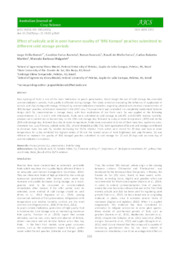Effect of salicylic acid in post-harvest quality of "BRS Kampai" peaches submitted to different cold storage periods.
Effect of salicylic acid in post-harvest quality of "BRS Kampai" peaches submitted to different cold storage periods.
Summary: Fast ripening of fruits is one of the main hindrances to peach preservation. Even though the use of cold storage has extended commercialization periods, fruit quality is affected during storage. This study aimed at evaluating the influence of application of salicylic acid (SA) during cold storage, followed by commercialization simulation, regarding physical and chemical characteristics of ?BRS Kampai? peaches, which were harvested in the 2017 crop. The experiment was conducted in a completely randomized factorial design (4×3: SA concentrations × storage days), with four replications of ten fruits each. SA was applied at the following concentrations: 0, 2, 4 and 6 mM. Afterwards, fruits were submitted to cold storage at 1±0.5ºC and 80-85% relative humidity. Analyses were carried out on harvest day, on the 10th cold storage day, followed by a day at room temperature (20ºC) and on the 20th cold storage day, followed by a day at room temperature. Fruits were evaluated in terms of their mass loss, epidermis color, chromatic hue, pulp firmness, soluble solids (SS), pH and titratable acidity (TA). Both application of SA and cold storage contributed to decrease mass loss and TA, besides increasing the SS/TA relation. Fruits which were stored for 20 days and kept at room temperature for a day exhibited the highest values of SS and the lowest values of both brightness and pulp firmness. SA was efficient to maintain the quality of ?BRS Kampai? peaches submitted to cold storage for 10 and 20 days and an extra day of commercialization simulation.
Publication year: 2021
Types of publication: Journal article
Observation
Some of Embrapa's publications are published as ePub files. To read them, use or download one of the following free software options to your computer or mobile device. Android: Google Play Books; IOS: iBooks; Windows and Linux: Calibre.
Access other publications
Access the Agricultural Research Database (BDPA) to consult Embrapa's full library collection and records.
Visit Embrapa Bookstore to purchase books and other publications sold by Embrapa.

